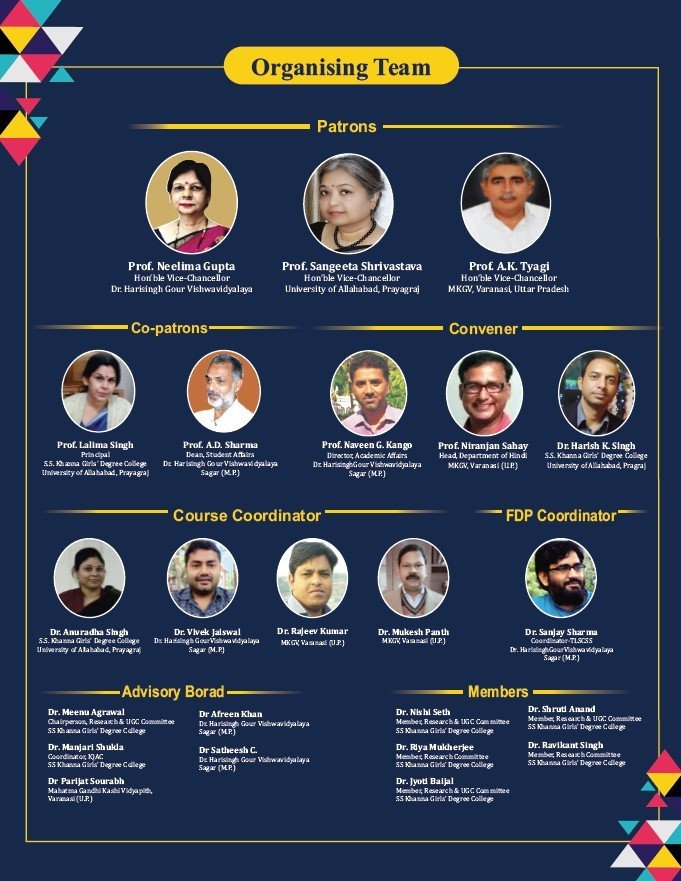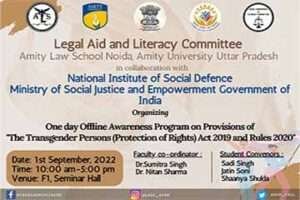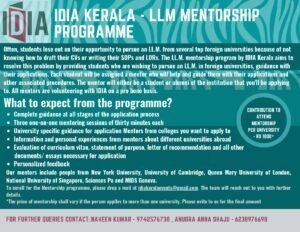A-One Week Online Interdisciplinary Capacity Building & Faculty Development Programme Research & Publication Ethics: Issues and Challenges from 24 – 29 March 2022
About Dr. Harisingh Gour Vishwavidyalaya, Sagar (Formerly University of Sagar)
Located in Madhya Pradesh, the heart of the nation has a beautiful campus endowed with natural beauty. The University came into existence on July 18, 1946. Doctor SirHarisingh Gour was the Founder Vice-Chancellor of this University. Apart from being a great jurist and legal luminary par excellence, he was a great patriot, philanthropist, educationist, and social reformer. The University was accorded Central University Status on January 15, 2009, and has been accredited with ‘A’ Grade by NAAC for the third time in a row in the 3rd Cycle.
Teaching Learning Centre for Social Science (TLCSS) is a Centre for Empowering Social Science teachers at school to higher education level in content, context, and classroom practices. TLCSS primarily focuses on identifying effective ways of learning-teaching methodologies in social science subjects, which can enhance the quality of education at all levels in India with reference to learners’ performance, learning achievements, enhancing cognitive abilities, and reducing dropouts, etc.
For this purpose, Pandit Madan Mohan Malaviya National Mission on Teachers and Teaching (PMMMNMTT) is visualized to engage and facilitate School and University teachers and teacher educators for developing proficiency in academic and pedagogic concerns, administration, leadership, and management. This would help them further in pursuit of research and classroom teaching-learning processes and may improve the quality and equity of the classroom and education system. With the above concerns, TLCSS has been established in Dr. Harisingh Gour Vishwavidyalaya in accordance with the 12th Five Year Plan.
About Sadanlal Sanwaldas Khanna Mahila Mahavidyalaya, Prayagraj
Sadanlal Sanwaldas Khanna Mahila Mahavidyalaya, Prayagraj, was established in the International year for
Women, 1975, with a vision of empowering women’s education. The college has grown from a single faculty to a composite institution wherein education is being imparted in the faculty of Arts, Science, Commerce, Teacher Education, and Law at the under-graduate and post-graduate levels. The college is exclusively for women and aims to cater for the needs of students belonging to diverse socio-economic backgrounds, to cultivate moral, intellectual, spiritual, social, and emotional values for the all-round development of the students. The institution is a constituent college of the central University of Allahabad and is completely equipped with all modern amenities in a beautiful architectures building. It is popular among students willing to receive a quality education through an experienced team of faculty. It has been accredited “A” Grade by NAAC in 2020-21. The college has been awarded the status of “College with Potential for Excellence” by UGC. It has also been selected under the strengthening component of Star College Scheme, Department of Biotechnology, Government of India in 2019-20.
About Mahatma Gandhi Kashi Vidyapith Varanasi (UP)
Mahatma Gandhi Kashi Vidyapith is a Public University located in Varanasi or Benaras, Uttar Pradesh, India. Established in 1921 as Kashi Vidyapith and later renamed, it is administered under the state legislature of the government of Uttar Pradesh. The university has more than 350+ affiliated colleges spread over five districts. It is one of the largest State Universities in Uttar Pradesh, with hundreds of thousands of students, both rural and urban. It offers a range of Professional and Academic courses in Arts, Science, Commerce, Law, Computing, and Management.
Our mission is to impart state of art education and technical expertise to students and give necessary training to teachers to create a self-reliant society for the future and encourage students to participate in Indian and International activities in sports, literature, etc. so that future generation becomes base
for a free and liberal society.
The context: Research, Researcher and Researching
Research and Re-searching, as an idea and practice, are always manifested in actions and reflections for the betterment of humanity. It is a conscious process of socialization and development of individuals, society, nation, and thereby of humanity. It also nurtures the civilizational agenda and transcendental purposes of mankind with objectivity. With the advent of modernity, it also emerged as a growing trajectory of actualizing the developmental needs and aspirations of people. Thus, research should be able to provide quality nutrients to the body, mind, and soul to promote the spirit of universal brotherhood and to enrich other aspects of the human agency during the civilizational discourse.
Undoubtedly, research is a vital force for humane excel. NEP-2020 has streamlined and created an ecosystem for humanistic, scientific, and contextual research.
Research ethics defines the way to incorporate ethical principles into research practice in all stages of the
investigation, from planning and inception through to completion and dissemination of results. Maintaining ethics in research and publication is of paramount importance in academics. This course aims to deepen the student’s understanding of moral philosophy employing a thorough investigation of two (related) debates in the field, using both primary and secondary literature. Students will also improve and practice their ability to conceive, conduct, and present philosophical research at an academic level.
People are now deceiving academics by accepting works for publication and author fees without performing the promised quality checks for issues such as plagiarism or ethical approval. Predatory journals take advantage of authors by requesting them to publish for a fee without offering peer-review or editing services. Because predatory publishers do not adhere to academic publishing norms, they usually publish a paper quickly. This program will develop an understanding in Research scholars and also faculty members that how they can catch the fake or clone journal. This program will also put light on Open Access Publishing Open access allows others to read research without barriers. It gives greater opportunity to researchers to build their work on Existing knowledge.
In accordance with the University Grants Commission 543rd meeting held on 9th August 2019, circular (D.O.No.F.1-/2018)(Journal/Care) UGC has also emphasized this kind of Capacity Building Programme/Course to strengthen existing research in quality imperatives.
Course Objective
This capacity-building workshop aims to train faculty/ research scholars on a basic understanding of copyright, plagiarism issues, and publication ethics along with the following objectives-
To search, evaluate and consolidate research-oriented information
- To give hands-on training on different software to curb the plagiarism
- To develop research impact assessment skills, citations, journal impact factor and Altmetrics, etc
- To comprehend the research envisioned in the NEP 2020
- To explore the methodology framework for quality research
- To frame out methodology approach for reestablishing the Indian knowledge system as part of the research paradigm.
It’s high time to evaluate the entire education system and strengthen researchers’ agency not only in pre-textual heritage and textual underpinning but also to re-examine with the contextualized researching needs.
Course Highlights
- Philosophy and Ethics
- Scientific Conduct
- Publication Ethics
- Open Access Publishing
- Publication Misconduct
- Citation Database
- Reference Management
- Qualitative Research
Web Platform
Course Methodology
- E-lecture
- Online Group Discussion
- Individual Assignment
- Group Assignment
- Feedback
- Video lecture
- E-tutorial
- Multiple Choice Question
- Seminar Presentation
Registration
- Registration is mandatory for all the participants of the FDP.
- All those who meet the eligibility criterion are required to pay a Non-Refundable fee of INR 500/- (For Research Scholar), INR 1000/-(For Faculty). Kindly see the details provided below regarding the payment process.
- The eligible participants who have made the payment are required to register online on or before 22 March 2022, 11:59 PM
- Kindly visit the Webpage: www.mgkvp.ac.in or www.dhsgsu.ac.in for updates
- Selected participants will be informed through their registered email ID only.
- Registration Link: https://forms.gle/6eRsMiUw4n4PmCaX7
Important
- Participants must attend all the online sessions in order to receive a certificate of participation.
- The sessions on various themes of the FDP will be conducted either on a live basis or through the
TLCSS Web portal. - Attempting and submitting all the quizzes/assignments/seminars are mandatory, and each participant should score a minimum of 50% (Grade-B) in total to avail of the programme completion certificate.
- Graded certificates on the basis of performance will be awarded to the participants.
- As part of the TLC requirement under the PMMMNMTT scheme, all participants need to submit online feedback for each session.
- Further, participants may be asked to share the responsibility of writing reports /reviews of sessions.
- Failing to meet any of the above conditions will result in the denial of a certificate of completion to the participants.
- The medium of interaction /lecture /deliberation will be bilingual (Hindi /English).
Payment Process & Steps of Registration
Step First
The participants must make the prescribed payment either through the (NEFT/IMPS) to the below-mentioned account and keep the screenshot of their payment for further clarification.
Account Name: Teaching Learning Centre
Account Number: 36335914463
Bank & Branch: State Bank of India (SBI), UTD Branch, Sagar
IFSC: SBIN0001143
MICR Code: 470002303
Step Second
- Participants need to fill up the online application form with all the required details before the final date of submission.
- The screenshot of the payment should be uploaded while filling the form.
- The participants are advised to carefully fill in their transaction details of payment at the time of filling of the registration form.
- Kindly take note that late applications and payments may not be accepted.
- The last date of registration is 22March 2022, 11:59 PM.

Previous Posts
Global Advances in Victimology and Psychological Studies
E Conference Seminar on The Multimodal Conundrums of Sports Law: Towards a Lively Pitch in India
National Seminar On Enlivening Ambedkar’s Vision On Constitutional Morality And Constitutionalism
Keywords
Research & Publication Ethics, Research Ethics, Publication Ethics




